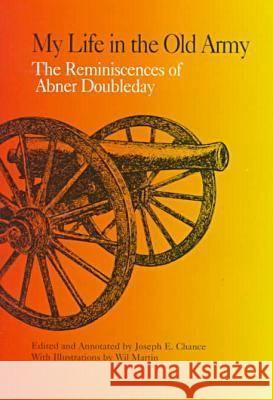My Life in the Old Army: The Reminiscences of Abner Doubleday from the Collections of the New-York Historical Society » książka
My Life in the Old Army: The Reminiscences of Abner Doubleday from the Collections of the New-York Historical Society
ISBN-13: 9780875651859 / Angielski / Twarda / 1998 / 404 str.
My Life in the Old Army: The Reminiscences of Abner Doubleday from the Collections of the New-York Historical Society
ISBN-13: 9780875651859 / Angielski / Twarda / 1998 / 404 str.
(netto: 101,46 VAT: 5%)
Najniższa cena z 30 dni: 104,77
ok. 16-18 dni roboczych.
Darmowa dostawa!
"This was the very life I had been desirous of leading. To mix with the Mexican rancheros and see more of their manner of living.
"When the news came that a treaty of peace had actually been signed with Mexico we joyfully turned our face homewards that is towards the sea coast, taking with us the heavy guns which had been an object of so much care and solicitude in the past."
Often thought of as the inventor of baseball, Abner Doubleday was first and foremost a soldier. Graduated from West Point in 1842 (where his record characterizes him as "correct in his deportment, social and communicative. . . rather adverse to outdoor sports and retiring in his manner"), Doubleday was an active participant in the Mexican War (1840s), the Seminole Wars in Florida (1850s), a veteran of service on the Texas frontier (1850s, 1870s), the man who ordered the first Union salvo from Fort Sumter in April 1861, and a veteran of many Civil War battles, including Gettysburg and Chancellorsville. He retired from the United States Army in 1873 and died in 1893.
Doubleday was also the author of two published books on his Civil War experiences. "My Life in the Old Army," however, is composed of a set of previously unpublished writings (the originals are housed at the New-York Historical Society) primarily about Doubleday's tour of duty during the Mexican War. He was on hand for the first shots of the war, for the battles of Monterrey and Buena Vista, and later served in Saltillo after the campaign moved farther south toward Mexico City. Fluent in Spanish, he traveled far and wide in Mexico and describes his experiences. "This is the very life I had been desirous of leading," he writes. "To mix with the Mexican rancheros and see more of their manner of living." The volume includes chapters on campaigns against hostile Native Americans in Texas and Florida.
Throughout his life, according to editor Joseph Chance, Doubleday collected anecdotes and stories of the great and the forgotten military men of the United States. Thus the book closes with a light-hearted final chapter about the "Old Army."
Whether Doubleday invented baseball during one of his many tours in Texas may never be known. His narrative mentions nothing of the great American pastime.
Copious notes and a complete bibliography enhance the volume.











